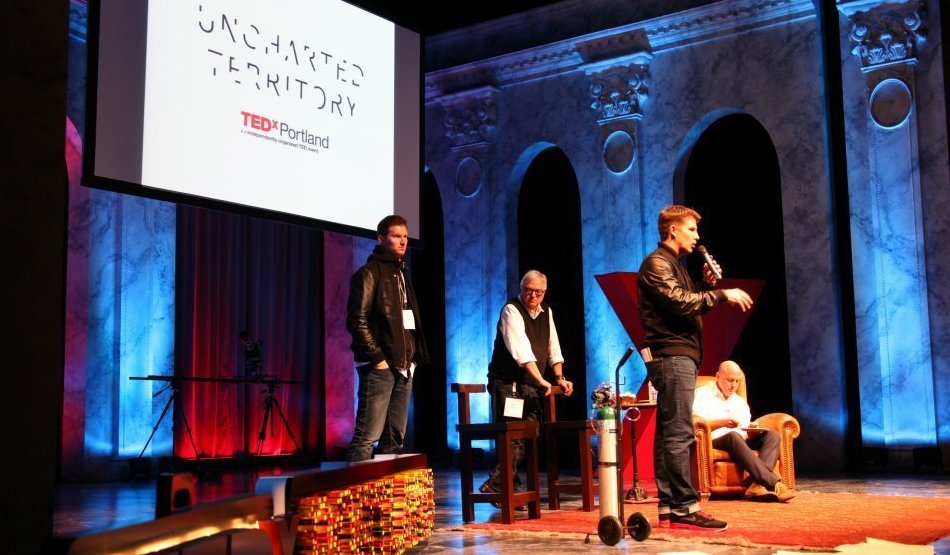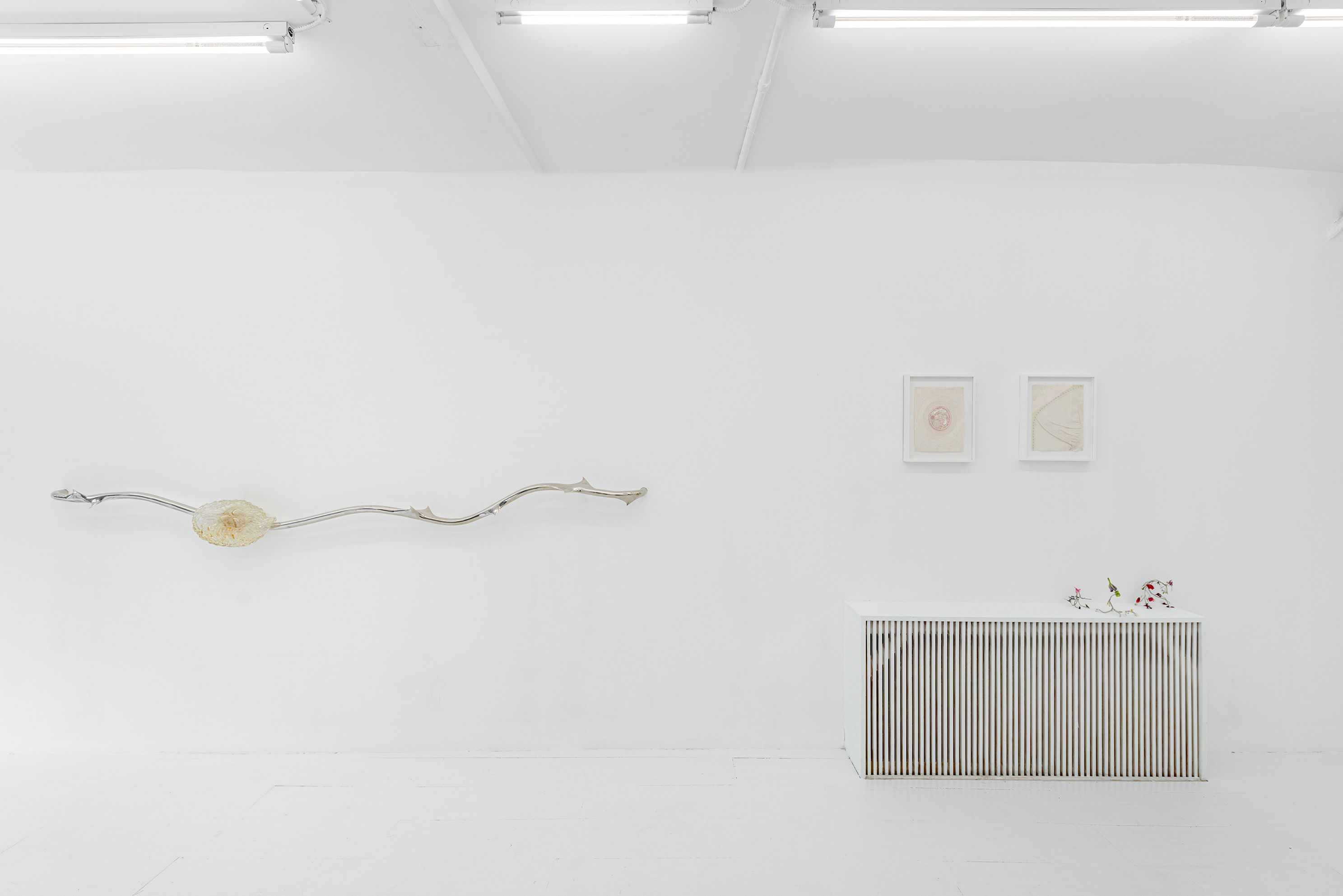TEDxPortland Tickets On Sale Monday

David Rae at the Gerding Theater for last year's 'Uncharted Territory' TEDxPortland.
Image: Courtesy TEDxPortland
For the past two years, TEDxPortland—a local, independently organized offshoot of the mind-bendingly popular lecture program—has filled Portland Center Stage’s Armory building with big ideas and even bigger crowds. But the Gerding wasn't enough to contain it: the event is moving into the Portland Art Museum for this year’s event on Saturday, April 27, and tickets go on sale Monday, March 25 at 8pm.
TEDxPortland will take over both ballrooms, the Miller Gallery, and the sculpture garden. Inspired by the Magic 8 Balls we turned to as uncertain kids, the theme is “What If?” The lineup so far includes:
-
News legend Tom Brokaw
- Seattle Internet innovator and meme kingpin Ben Huh, whose Cheezburger Network owns the likes of Can Has Cheezburger and the FAIL blog
- Portlandia director Jonathan Krisell
- Former Trail Blazer turned community crusader Brian Grant
- Lighting maven and Schoolhouse Electric founder Brian Faherty
- Locally cut but nationally trending chef Naomi Pomeroy
- Feast Portland co-founder and occasional PoMo contributor Mike Thelin
- Plus several more, making 13 in total plus three performances and four official TED talks streamed in from the mother ship
Tickets go on sale right afterward at 8 pm at the TEDxPortland site. If TED is your cup of brainy, then act fast. The past two years sold out in less than a day. And this one sold out in less than 12 hours.
Tickets are $100, which includes breakfast, lunch, a custom Magic 8 Ball, more shwag, afternoon Salt and Straw ice cream, complimentary happy hour in the sculpture garden, and all the Stumptown you can drink.
Leading up to the big day, an exhibition opens on April 4 at the University of Oregon’s White Box gallery consisting of work by local artists that is available for auction via the Portland Mercury and eBay to benefit the Children's Healing Art Project (CHAP).
TEDxPortland is a huge, entirely volunteer-run endeavor. There's a core team of 20 working year round, and then some 45 more rolling in to run the event. We got the original volunteer and founder, David Rae, on the phone to talk about how TEDxPortland came about, what's in store at the museum (think bean bag lounges and sculpture garden happy hours), and what the recipe is for a perfect talk.
Culturephile: When did you first come across TED?
Rae: The spring of 2008. Right around the time Chris Anderson, the CEO of TED, licensed the franchise, to scale the model with the x platform, was right when it caught my attention. A friend and Nike colleague, Mark Starkey, shot me a note that said, local event organizers can apply for and receive a license for no cost to curate their experience. I said, lets do it.
How did it grow from just the two of you to the glossy production at the Armory right out of the gate?
It took us a year to circle the wagons because we wanted to do it for 600–700 people, and we wanted to create a premium experience on the production side of things. It took us a year to recruit our core team of about 15 people—representatives from Wieden and Kennedy, Nike, Whole Foods came out of the woodwork. We originally wanted to house it on Nike’s campus, but it became too complicated. So we took it to the Armory, and that was one of the best decicsions we ever made. It was reflective of the Portland community, and the Armory was a wonderful host to us.
But you’re moving to the museum this year? Why?
Just when you thought it couldn’t get any bigger. The armory is great, but it’s very challenging, because we’re at the mercy of Portland Center Stage’s schedule. We get the keys at 10 the night before, set up through the night. Then the event begins at 8 am, and we had to be out by 5 pm to respect the show. We weren’t in the building for even 24 hours!
In our teardown meeting last year, we said let’s entertain other venues. We looked at the Schnitz and others, but then the Portland Art Museum approached us. We’d love to have you here, give you a great rate, and then you can have the entire building for three days. It’s going to be a multi-dimensional experience in the entire building, and we’re super excited. Kridel will house 900 people, which is where the “arena” will be for speakers. In the Sunken Ballroom, we’ll create a more casual environment. We’ll stream talks live, but down there will be Stumptown baristas, food all day, couches, beanbags, and interactive activities to keep everyone engaged. If you meet someone and want to have a talk over a talk, you can go down and still be in the know.
How do you pick the speakers?
It always starts with the theme. We then have speaker committee that makes the decisions after taking nominations from everybody—we've got about 200 people in a database who’ve been recommended to us over the last two years. It’s my favorite meeting of this entire process. We meet at Wieden and Kennedy and get in room with yellow stickies, we write the names and topics, and we debate who to ask and when. Then we start marching in September/October with invitations. The TEDxPortland brand has really become an institution here now. We only asked 14 speakers this year, and 13 said yes.
Do you coach the speakers?
There’s absolutely coaching, no matter who the person is. The beauty of TED is there’s no VIP treatment. We have a five-person speaker coaching committee; we have 3 local designers who help with brand strategy and design for presentations; we make every speaker do a dry run rehearsal.
Most TED talks follow a recipe of sorts. What are the ingredients of the perfect TED talk?
One, you have to make it very personal. Know your audience and bring them in so it’s authentic. Every good TED talk is judged on the actual concept and idea you’re trying to share and spread.
If I had to compartmentalize it into thirds: make it personal, think of your story arc and get to the idea or concept, and then decide how to end with an inspiring call to action. The beauty of a TED crowd is they’re all thinkers and doers, so what is the exclamation point at the end of your talk so people can jump out of their seat and have something tangible to incorporate into their lives to spread the idea.
TED talks are well known for these exclamation points, and for those ‘ah ha’ moments of revelation. Of all the Portland talks, what was the biggest ah ha moment for you?
It was not necessarily a talk. Everyone agrees: there’s an electricity in that room, in the audience, that’s palpable. It’s hard to describe, but you can truly feel the positive vibe and people who are ready to learn and be inspired. It’s addictive, like a drug. When I know like minded people are in the room committed to moving the needle for Portland, and the networking and connections made in that one day, it’s a seismic shift. The core is the speakers and the ideas, but the people who fill the Armory: it’s electric.




